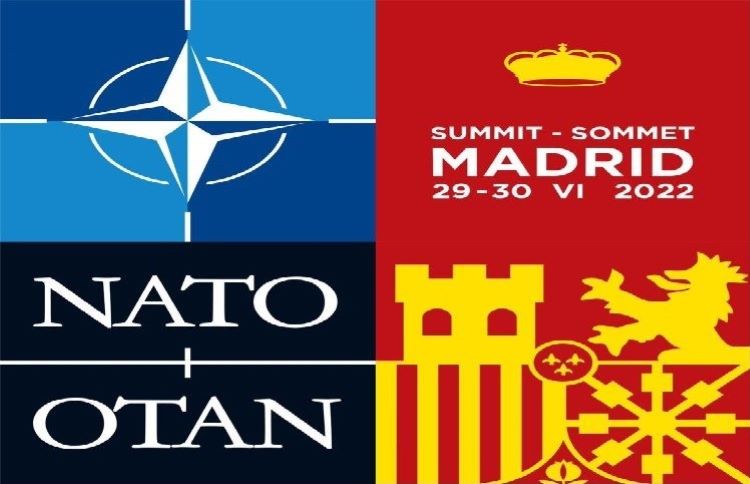The Diplomat
The Spanish government hopes that the crisis in Ukraine, which will be very present at the NATO Summit being held this week in Madrid, will not prevent the allies from recognising the threats coming from the southern flank in the new Strategic Concept.
This is highlighted in an article written for The Diplomat by Foreign Minister José Manuel Albares on Spain’s position at the Atlantic summit, which will be published on our website tomorrow.
Madrid will host the most eagerly awaited NATO summit in decades, in the midst of the 40th anniversary of Spain’s entry into the Alliance and in the midst of the international turmoil created by Russia’s invasion of Ukraine.
A total of 44 international delegations, 41 of them led by heads of state and government together with their foreign and defense ministers (the 30 member states, plus Bosnia and Herzegovina, Jordan, Mauritania, Japan, Australia, New Zealand, South Korea, Ukraine, non-NATO EU countries -Finland, Sweden, Austria, Malta, Cyprus and Ireland- and the leaders of the European Union), and around 5. 5,000 guests will attend the Summit, which will be held on June 29-30 at the Madrid Trade Fair Center (Ifema), which will be completely isolated for security reasons. According to government sources, the meeting will cost an estimated 50 million Euros, although the Government expects the economic benefits for Spain to clearly exceed that figure.
The first events prior to the Summit will begin today, with a press conference by NATO Secretary General Jens Stoltenberg, and will continue tomorrow, June 28, with a NATO Public Forum inaugurated by the Secretary General himself. Tomorrow, the President of the United States, Joe Biden, will also arrive in Spain. He will be received by the King at the Torrejón air base and will hold a meeting with the President of the Government, Pedro Sánchez (his first formal interview, beyond the brief contacts held in international meetings), at the Palace of La Moncloa. Biden will then go to the Royal Palace to meet with the King of Spain and attend the gala dinner offered by Felipe VI to the participants in the Summit.
In addition, Pedro Sánchez has scheduled other bilateral meetings with the Prime Minister of Australia, Anthony Albanese; the Prime Minister of New Zealand, Jacinda Arden; the Prime Minister of Iceland, Katrín Jakobsdóttir; and the Prime Minister of Canada, Justin Trudeau (at the end of the Summit). Likewise, the Chief Executive will have lunch tomorrow with Jens Stoltenberg, just before meeting with Biden.
His Majesty the King is also scheduled to receive Stoltenberg tomorrow and to take part in the ‘NATO Public Forum’ organised by the Elcano Royal Institute together with other European think-tanks. He will also receive separately the President of the European Council, Charles Michell, the President of the European Commission, Ursula von der Leyen, and the EU High Representative for Foreign Policy, Josep Borrell. He will also meet with the President of South Korea, Yoon Suk Yeol, and the President of Finland, Sauli Vainamo Ninistro, as well as with the President of the NATO Military Committee, Admiral Rob Bauer.
Agenda and major issues
The Summit as such will begin on June 29, with a public opening address by Stoltenberg and Sánchez and two sessions (morning and afternoon) of the North Atlantic Council at the level of heads of state and government. The morning session will be devoted exclusively to Ukraine and will include the participation of President Volodymir Zelenski via videoconference. Both sessions will conclude with press conferences by the Secretary General.
The day will include three informal working dinners of the Foreign Affairs ministers (in which the representatives of two NATO partner countries, Jordan and Mauritania, will participate and in which the Southern Flank will be discussed), the Defense ministers and the heads of state and government, chaired by Pedro Sánchez and to be held at the Prado Museum. On June 30, the North Atlantic Council will meet again at the level of Heads of State and Government, which will be followed by a new press conference by the NATO Secretary General, in addition to those which may be given by the Heads of State or Government who so wish.
As for the major issues to be addressed at the Summit, allied leaders will discuss how “the brutal and unprovoked Russian invasion of Ukraine and the new security reality in Europe has affected NATO’s approach to deterrence and defense”, “what the Alliance is doing to address other challenges, such as China’s growing influence and assertiveness or the security implications of climate change” and on NATO’s upcoming Strategic Concept, “the blueprint for the Alliance’s future adaptation to a more competitive world in which authoritarian powers seek to oppose the rules-based international order,” the Alliance said.
Ukraine, Strategic Concept
According to NATO, “Russia’s war against Ukraine has shattered peace in Europe, provoked far-reaching energy and food crises, and shaken the rules-based international order.” Nevertheless, the Alliance continues, “NATO’s response has been swift and united,” demonstrating that, “more than ever, NATO is the indispensable platform for transatlantic security and defense consultation and cooperation.”
In these circumstances, “at the Madrid Summit, Allies will continue to adapt, taking decisions to keep NATO strong and ready in a more dangerous world,” to which end, the Alliance website continues, heads of state and government will strengthen deterrence and defense “with more presence, capabilities and readiness” and commit to support Ukraine “over the long term” (apart from Zelensky’s virtual participation, Foreign Minister Dmytro Kuleba is scheduled to attend).
The first day’s meetings will also address the Strategic Concept 2022, “which will be a roadmap for the Alliance in the coming years,” assessing the “changing security environment and reaffirming NATO’s values, purposes and tasks” and setting out “NATO’s joint positions, including on Russia and new challenges and, for the first time, and the role of China. The allies will also address in the document – which will be some 15 pages long – the problem of the Southern Flank. This has been one of the main demands of Spain, which has warned on numerous occasions of the security threats coming from the Sahel and the “growing” presence of Russia in African countries.
Other items on the agenda are the strengthening of cooperation with like-minded countries and organizations, with special attention to the decision of Finland and Sweden to apply for NATO membership, the support to Georgia and other partners “to develop their capabilities and strengthen their resilience” and the rapprochement with Asia-Pacific partners, namely Australia, Japan, South Korea and New Zealand, which “are participating for the first time in a NATO Summit”. The issue of Sweden and Finland joining NATO is being delayed due to Turkey’s disagreements, although negotiations are still underway to reach an agreement that will enable their accession to be finalized at this Summit.
The Summit will also address the need to confront threats such as “terrorism, cyber-attacks, China’s coercive policies, disruptive technologies and the impact of climate change on security.” To that end, NATO leaders will make decisions to maintain the Alliance’s technological edge through the new North Atlantic Defense Innovation Accelerator and a €1 billion Innovation Fund to support start-ups and develop cutting-edge solutions to security challenges.







